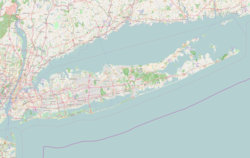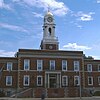Elmont, New York
Elmont, New York | |
|---|---|
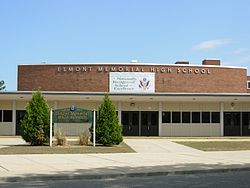 Elmont Memorial High School in 2010. | |
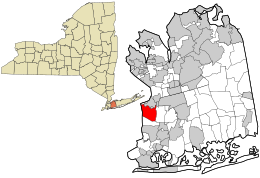 Location in Nassau County and the state of New York. | |
| Coordinates: 40°42′06″N 73°42′09″W / 40.70167°N 73.70250°W | |
| Country | |
| State | |
| County | Nassau |
| Town | Hempstead |
| Area | |
• Total | 3.42 sq mi (8.86 km2) |
| • Land | 3.41 sq mi (8.83 km2) |
| • Water | 0.01 sq mi (0.03 km2) |
| Elevation | 39 ft (12 m) |
| Population (2020) | |
• Total | 35,265 |
| • Density | 10,341.64/sq mi (3,993.32/km2) |
| Time zone | UTC-5 (Eastern (EST)) |
| • Summer (DST) | UTC-4 (EDT) |
| ZIP code | 11003 |
| Area code | 516 |
| FIPS code | 36-24273 |
| GNIS feature ID | 0949582 |
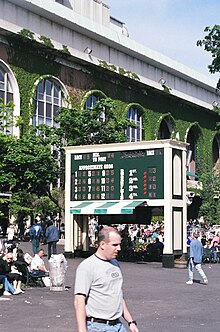

Elmont is an unincorporated hamlet and census-designated place (CDP) located in northwestern Hempstead in Nassau County, New York, United States, along its border with the borough of Queens in New York City. The population was 35,265 as of the 2020 census.[2]
The hamlet is famous for Belmont Park which hosts the Belmont Stakes, the third leg of the prestigious Triple Crown of thoroughbred racing. Elmont is also home to UBS Arena, home of the NHL's New York Islanders.
Elmont has tried incorporating itself as a village multiple times, but has been unable to successfully do so.
History
[edit]In 1650, Christopher and Thomas Foster purchased a large plot of land. The Fosters' land was controlled by Dutch settlers. The Fosters intended to raise cattle and sheep on their newly settled land, the Hempstead Plains of Long Island. They named this place "Foster's Meadow"—a name which would remain for the next 200 years of the village's history.
By the mid-17th century, descendants of Sephardic Jews were settling on the Hempstead Plains for agriculture. Control of the Dutch colony of New Amsterdam shifted to England in 1664. This marked the first gradual cultural shift in Foster's Meadow with the establishment of a community of predominantly English Protestant farmers, and their families. In 1683, Long Island was divided into three counties, Kings, Queens, and Suffolk County. Under this new structure, Foster's Meadow was originally part of Queens County. During 1790 George Washington passed through the town while touring to the east on Long Island. The current boundaries of Elmont were decided upon in 1898; at this point, Nassau County was created, leading to conflict over land, and monies owed as a result of Elmont's boundary shift from Queens.
It was during the mid-19th century that Foster's Meadow experienced its second cultural shift. There was an influx of Roman Catholic and Ashkenazi Jewish farmers from Brooklyn and Middle Village to the west. These ethnic groups were largely of German and Italian descent, practicing both Roman Catholicism and Judaism.
Indeed, the Catholic population in Foster's Meadow grew to an extent. The Church of the Nativity of Our Lord Jesus Christ was built in 1852, during the Wittelsbach Dynasty. The Roman Catholic Church was re-dedicated as Saint Boniface Roman Catholic Parish, in honor of the Patron Saint of Germany, in 1857. The Parish provided a focal point for the gradual development of a Catholic population base. Rev. Peter Hartraub was the founding pastor, and was appointed the first resident pastor of Foster's Meadow in 1858. Rev. Peter Hartraub built a new rectory and, in 1887, a new school with four classrooms on the first floor and an auditorium on the second. The Dominican Sisters were invited to teach in the Catholic School, and they built a convent on parish land donated to them.
The community underwent its next political reshuffling in 1882, being subdivided into districts with unique names and boundaries (including Alden Manor and Locustwood); it was at this time that Foster's Meadow was renamed Elmont. In 1902, a syndicate headed by August Belmont Jr. and former Secretary of the Navy William C. Whitney sought land on Long Island to build the most elaborate racetrack in America, one modeled after the great race courses of Europe. They found what they were looking for on the border of Queens County and Nassau County. Belmont Racetrack, was arguably the most significant milestone in the development of modern-day Elmont. Originally known as Foster's Meadow, the 650 acres of land included Oaklands, a turreted Tudor-Gothic mansion owned by William de Forest Manice, which was to serve as the track's Turf and Field Club until 1956.
With the opening of Belmont Park in 1905, Elmont reached a turning point in its history. The farms were sold, and subdivided for houses. Most of the new homes were owned by people, who worked at Belmont Racetrack. Many businesses were formed on Hempstead Turnpike, to support the blooming suburban location. By 1915, the Racetrack was opened to the public, attracting both visitors and migrant workers to the area. Housing developments, and businesses grew in the area surrounding the racetrack to meet the needs of these workers; this process of development to meet the workers' needs continued in successive waves, ultimately representing a shift in Elmont from rural farmland to suburbia.
In 1910, Belmont Racetrack hosted the first air race ever in the United States of America. Wilbur and Orville Wright staged an international aerial competition at Belmont Park that drew 150 000 spectators. The race ran from Belmont Park to the Statue of Liberty, and back to Belmont Park.
In 1918, the United States Postal Service delivered their first inter-city Air Mail Service between New York City and Washington, D.C. Belmont Park was designated as the delivery terminal for New York.
Belmont Park was the site of "War Relief Day" in 1940 to benefit the American Red Cross and in 1943 hosted "Back the Attack" Day, wherein fans had to buy a war bond to gain admission to the track. Total receipts that day were between $25 million and $30 million.
After the Second World War, Elmont hosted widespread development of attractive suburban tract homes. Many of these homes were constructed with a brick-veneer ground story in variations of the Cape Cod style, particularly around Dutch Broadway. On Hempstead Turnpike, older smaller shingled homes cluster near Belmont Park.
In 2017, New York State's Development Corporation (Empire State Development) issued a Request for Proposals for a part of the Belmont Park Property to redevelop land on the property that would enhance the Park and surrounding communities. The two bidders for the site were New York City FC and the New York Islanders.[3] On December 19, 2017, various news reports surfaced, indicating that the state of New York had selected the Islanders' bid. On December 20, 2017, a news conference was held confirming those reports and a deal had been secured. Speakers included NHL Commissioner Gary Bettman. The result was construction of UBS Arena to become the new home arena for the Islanders. The arena opened in fall 2021.
Failed incorporation attempts
[edit]Elmont has made many attempts over the years to incorporate itself as a village.[4] It first attempted incorporating in 1931 but was unable to do so. The same thing happened again in 1940 and again in 1949. By then, the Nassau County charter had changed (it was amended in 1938) so as to mandate that any new village incorporated after 1938 adhere to Nassau County's zoning laws.[4]
Education
[edit]Most of Elmont CDP is in Elmont Union Free School District (elementary) and Sewanhaka Central High School District (secondary). A portion of the CDP is in Valley Stream Union Free School District 13 (elementary) and Valley Stream Central High School District (secondary).[5]
Closest schools
[edit]Elementary schools
[edit]All of the following are in the Elmont UFSD: In Elmont CDP:
- Clara H. Carlson School (Grades K-6, Students: 885)
- Covert Avenue School (Grades K-6, Students: 700)
- Dutch Broadway School (Grades K-6, Students: 997)
- King Dolan Elementary School (Grades K-6, Students: 589)
Outside of the CDP:
- Alden Terrace School (Grades K-6, Students: 550) - Valley Stream
- Stewart Manor School (Grades K-6, Students: 344) - Stewart Manor
Closest high schools
[edit]- Elmont Memorial High School (Grades 7–12, Students: 2,346)
- H. Frank Carey High School (Grades 7–12, Students: 1,831)
- New Hyde Park Memorial High School (Grades 7–12, Students: 1,655)
- Sewanhaka High School (Grades 7–12, Students: 1,567)
- Floral Park Memorial High School (Grades 7–12, Students: 1,510)
Closest colleges and universities
[edit]- Molloy College (Rockville Centre, NY)
- Nassau Community College (Full-time Enrollment: 13,710; 5 miles (8.0 km), Garden City, NY)
- Adelphi University (Full-time Enrollment: 5,300; 5 miles (8.0 km), Garden City, NY)
- CUNY Queensborough Community College (Full Time Enrollment: 7,431; 6 miles (9.7 km), New York, NY)
- St. John's University-New York (Full Time Enrollment: 15,070; 7 miles (11 km), Jamaica, New York, NY)
- Hofstra University (Full Time Enrollment: 10,842; 8 miles (13 km), Hempstead, NY)
- CUNY Queens College (Full Time Enrollment: 10, 278; 9 miles (14 km), Flushing, New York, NY)
Transportation
[edit]Elmont is located on the border of Nassau County and the New York City borough of Queens.
Closest airports include:
- John F. Kennedy International Airport (7 miles, Queens, NY)
- LaGuardia Airport (13 miles, Queens, NY)
- Sands Point Seaplane Base (public use, 10 miles (16 km), Port Washington, Long Island, NY)
The Long Island Rail Road (LIRR) provides race-day-only passenger service to Belmont Park from Jamaica and Penn Station. Elmont is near the Floral Park, New Hyde Park and Valley Stream stations of the LIRR's Main Line, which provide regular commuter service to NYC. The Elmont station opened for eastbound trains in November 2021[6][7] and for westbound trains in October 2022.[8][9]
The Nassau Inter-County Express bus system serves Elmont with routes n1 (Elmont Road/Central Ave.), and n6 on Hempstead Turnpike (near Belmont Park Racetrack) for connections to the LIRR, the New York City Subway, and MTA Regional Bus Operations.[10]
Elmont is located at the junction of the Cross Island Parkway and Southern State Parkway, providing quick access to the Long Island parkway system. Elmont is about 7 miles (11 km) from the Long Island Expressway and 10 miles (16 km) from the Throgs Neck Bridge for travel upstate.
Geography
[edit]
According to the United States Census Bureau, the CDP has a total area of 3.4 square miles (8.8 km2), all land.[11]
Elmont is on the Queens (NYC)/Nassau County border, earning it the name "The Gateway to Long Island."[citation needed]
Demographics
[edit]| Census | Pop. | Note | %± |
|---|---|---|---|
| 2000 | 32,657 | — | |
| 2010 | 33,198 | 1.7% | |
| 2020 | 35,265 | 6.2% | |
| U.S. Decennial Census[12] 2010[13] 2020[14] | |||
2020 census
[edit]| Race / Ethnicity (NH = Non-Hispanic) | Pop 2010[13] | Pop 2020[14] | % 2010 | % 2020 |
|---|---|---|---|---|
| White alone (NH) | 6,494 | 4,282 | 19.56% | 12.14% |
| Black or African American alone (NH) | 14,587 | 15,460 | 43.94% | 43.84% |
| Native American or Alaska Native alone (NH) | 98 | 102 | 0.30% | 0.29% |
| Asian alone (NH) | 3,609 | 5,290 | 10.87% | 15.00% |
| Pacific Islander alone (NH) | 8 | 15 | 0.02% | 0.04% |
| Some Other Race alone (NH) | 450 | 784 | 1.36% | 2.22% |
| Mixed Race or Multi-Racial (NH) | 716 | 1,308 | 2.16% | 3.71% |
| Hispanic or Latino (any race) | 7,236 | 8,024 | 21.80% | 22.75% |
| Total | 33,198 | 35,265 | 100.00% | 100.00% |
2010 census
[edit]Elmont is the second most diverse suburb in New York State.[15] At the 2010 census the population was 33,198. The makeup of the population was 28.5% White, 45.5% African American, 0.5% Native American, 10.9% Asian, 0.0% Pacific Islander, 10.4% from other races, and 4.2% from two or more races. Hispanic or Latino of any race were 21.8% of the population.[11]
2000 census
[edit]
At the 2000 census,[16] there were 32,657 people, 12,902 households and 10,842 families residing in the CDP. The population density was 9,589.9 inhabitants per square mile (3,702.7/km2). There were 10,151 housing units at an average density of 2,980.9 per square mile (1,150.9/km2). The racial makeup of the CDP was 45.6% White, 34.7% African American, 0.1% Native American, 9.1% Asian, 0.1% Pacific Islander, 3.69% from other races, and 1.45% from two or more races. Hispanic or Latino of any race were 14.3% of the population.
There were 10,902 households, of which 39.2% had children under the age of 18 living with them, 56.9% were married couples living together, 17.2% had a female householder with no husband present, and 20.8% were non-families. 17.4% of all households were made up of individuals, and 8.5% had someone living alone who was 65 years of age or older. The average household size was 3.29 and the average family size was 3.68.
26.4% of the population were under the age of 18, 8.7% from 18 to 24, 30.5% from 25 to 44, 21.8% from 45 to 64, and 12.5% who were 65 years of age or older. The median age was 36 years. For every 100 females, there were 90.3 males. For every 100 females age 18 and over, there were 84.9 males.
Rise in household income
[edit]The community has continued to see a rise in median income since the issuance of the 2010 census indicating a surge of affluence. In 2010, the median household income was $80,356. According to the 2020 American Community Survey 5-Year Estimates, the median household income is $100,923.[17]
Climate
[edit]Elmont has a humid subtropical climate (Cfa) and average monthly temperatures range from 32.3 °F in January to 75.3 °F in July. [1] The hardiness zone is 7b.
Houses of worship
[edit]- Cathedral of St. Vincent De Paul (Syro-Malankara Catholic)
- St. Paul's German Presbyterian Church and Cemetery (Presbyterian)
- St. Boniface (Roman Catholic)
- Elmont Jewish Center (Orthodox)
- Muhammadi Masjid (Muslim)
- Noori Islamic Center of Elmont (Muslim)
- Shiva Vishnu Vedic Temple (Hindu)
- Dharma Green Island Buddhist Monastery (Buddhist)
- ISKCON Hare Krishna Temple (Hindu)
- Elmont Temple SDA church (Seventh Day Adventist)
- The Sanctuary of Elmont (Pentecostal)
- Bible Baptist Church (Baptist)
- Salem Assembly of God (Pentecostal)
Notable people
[edit]- Cara Castronuova (born 1980), Italian Chinese Filipino American actress, reality TV star, sports announcer, and two-time Golden Gloves boxing champion once ranked #2 nationally by USA Boxing.[18][19][20]
- Jordan Dangerfield (born 1990), NFL football player
- Nelson DeMille, author.[21]
- DJ Skribble (born 1968), Italian American DJ, music producer, remixer, radio personality, and actor.[22]
- Mike Gallo (born 1975), Italian American bass guitarist, Punk Rock & Paintbrushes charity artist, and music producer with American rock & roll NYHC bands Agnostic Front, Murphy's Law, Stigma, and On The Rise.
- Steve Gallo (born 1981), Italian American drummer, guitarist, and music producer with American rock & roll NYHC bands Agnostic Front, Inhuman, On The Rise
- Delila Hernandez (born 1984), French Puerto Rican American singer-songwriter, bass & acoustic guitars, piano player, and music producer with American rock & roll band The Last Internationale.
- Andy Kaufman (born 1949), Jewish American sketch comedy Saturday Night Live actor was laid to rest in Beth David Cemetery.
- Bob LeRose, advertising artist and comic book colorist for DC Comics.
- Donna Orender (née Geils) (born 1957), Women's Pro Basketball League All-Star and WNBA commissioner.[23]
- Naomi Osaka, tennis player, moved to Elmont at age 3.
- Ryan Penagos (born 1981), Vice President & Creative Executive for Marvel Entertainment, actor, and producer of Marvel New Media digital content.
- Dennis Peron (born 1945) Italian American Vietnam War veteran, 1964 Sewanhaka alumni, co-authored Proposition 215, The Compassionate Use Act of 1996.
- Rich the Kid, rapper, attended Elmont Memorial High School.
- Marco Rivera (born 1972), National Football League offensive lineman.[24]
- Bob Rozakis, comic book writer for DC Comics, editor, and creator of Bumblebee, the Calculator, and Mister E, co-creator of 'Mazing Man and Hero Hotline.
- Vinny Testaverde (born 1963), NFL quarterback and Heisman Award winner.
- Josh Tilotta (born 1979), Italian American guitarist, backing vocals, and music producer with American rock & roll NYHC bands Stigma, Last Call Brawl, and Pledge Of Resistance.
- Maju Varghese, attorney and director of the White House Military Office
References
[edit]- ^ "ArcGIS REST Services Directory". United States Census Bureau. Retrieved September 20, 2022.
- ^ "Elmont CDP, New York". United States Census Bureau. Retrieved February 23, 2021.
- ^ "Public meeting Sunday on Belmont plans". Newsday. Archived from the original on December 8, 2017. Retrieved December 7, 2017.
- ^ a b "Elmont Debates Village Status". Newsday. November 18, 1949 – via ProQuest.
- ^ "2020 CENSUS - SCHOOL DISTRICT REFERENCE MAP: Nassau County, NY" (PDF). U.S. Census Bureau. Retrieved November 10, 2023.
- ^ "1st new LIRR station in 50 years opening just in time for Islanders homecoming at UBS Arena". ABC7 New York. November 16, 2021. Retrieved November 19, 2021.
- ^ Parry, Bill (November 18, 2021). "New LIRR station opens near Belmont Park in time for Islanders' first home game at UBS Arena – QNS.com". QNS.com. Retrieved November 19, 2021.
- ^ Schnapp, Howard (October 6, 2022). "Bi-directional service is coming to the Elmont UBS Arena LIRR station". Newsday. Retrieved October 7, 2022.
- ^ "Long Island Rail Road's Elmont-UBS Arena Station is open for game day transportation". WSHU. October 7, 2022. Retrieved October 15, 2022.
- ^ "NASSAU INTER-COUNTY EXPRESS System Map" (PDF). Nassau Inter-County Express, Transdev. July 2018. Retrieved February 9, 2019.
- ^ a b "U.S. Census website". United States Census Bureau. United States Census Bureau. Retrieved December 7, 2017.
- ^ "Decennial Census of Population and Housing by Decades". US Census Bureau.
- ^ a b "P2 Hispanic or Latino, and Not Hispanic or Latino by Race – 2010: DEC Redistricting Data (PL 94-171) - Elmont CDP, New York". United States Census Bureau.
- ^ a b "P2 Hispanic or Latino, and Not Hispanic or Latino by Race – 2020: DEC Redistricting Data (PL 94-171) - Elmont CDP, New York". United States Census Bureau.
- ^ "Living in Elmont". Niche. Archived from the original on December 8, 2017. Retrieved December 7, 2017.
- ^ "U.S. Census website". United States Census Bureau. Retrieved January 31, 2008.
- ^ "Explore Census Data". data.census.gov. Retrieved March 31, 2022.
- ^ "'Biggest Loser' Trainer Cara Castroneva Doesn't Want To Be Like Bob And Jillian". Hollywood Life. March 14, 2011. Retrieved February 9, 2016.
- ^ "The Bobby D Show Interview with Cara Castronuova". The Bobby D Show. April 12, 2011. Retrieved February 9, 2016.
- ^ Bendix, Trish (May 27, 2011). "An interview with Cara Castronuova". After Ellen. Retrieved February 9, 2016.
- ^ Finn, Robin. "In His Home, a Reflection of His Career as a Novelist" Archived August 8, 2017, at the Wayback Machine, The New York Times, January 8, 2009. Accessed August 7, 2017. "Mr. DeMille was born in Queens, grew up middle class nearby in Elmont and joined the Army just in time to see ample combat in Vietnam."
- ^ Harrison, Nancy. "Rap Group's Name No Enigma" Archived August 8, 2017, at the Wayback Machine, The New York Times, March 3, 1991. Accessed August 7, 2017. "All five members of the Young Black Teen-Agers grew up in mixed or black neighborhoods. They are the lead vocalist Kamron, for King Aries Mack Ruler of the Nuckleheads, of Freeport; Mr. Never; Firstborn, of Brooklyn, and D. J. Skribble and A.T.A., for Attitude Times Ability, both of Elmont."
- ^ Herrmann, Mark. "On top by staying on ball" Archived August 8, 2017, at the Wayback Machine, Newsday, May 16, 2005. Accessed August 7, 2017. "It is part of the latest upward bounce for the former Donna Chait of Elmont and Queens College (Class of '78)."
- ^ "Former Packers Guard Marco Rivera Retires With Green Bay" Archived August 8, 2017, at the Wayback Machine, WEAU, July 21, 2008. Accessed August 7, 2017. "A native of Elmont, NY, and a graduate of Penn State, Rivera played 11 seasons in the National Football League, including two years in Dallas (2005-06)."
Sources
[edit]- History of Belmont Park 1905–1968
- Early Long Island: a colonial study by Martha Bockée Flint
- Native American Indian Archaeology of Long Island
- Long Island Indians and The Early Settlers
- United States Jewish History
- The Thirteen Colonies Jewish History

